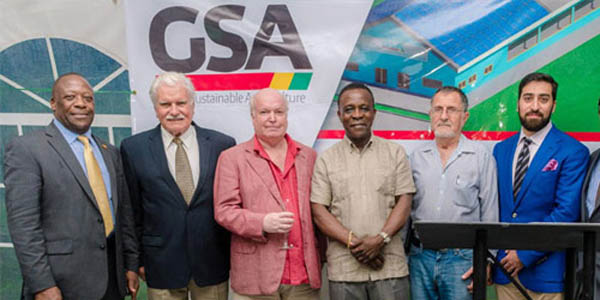|
|
|
 |
|
DF Aquaculture Capital Limited
is a company dedicated to
serve client and joint venture partner
needs worldwide.
These client/partners seek solutions for
sustainable aquaculture.
DF Aquaculture Capital (“DFAC”) Limited
provides capital, financing, management,
structure and training
in the high technology sustainable
aquaculture industry.
DFAC focuses on both sea vegetables
(sea lettuce, seaweed, sea asparagus)
as well as sea foods
(sea cucumber, shrimp, oysters, crab,
grouper, tuna, et al).
|
|
|
|
 |
|
|
|
Granada
Sustainable Aquaculture
GSA recent ground breaking with attendance
by the Prime Minister, other dignitaries and
the world press.
Another DF Aquaculture Capital project is
the Antigua Sustainable
Aquaculture Ltd.
Which is a Government joint venture
where the Government of
Antigua contributing cash, land and sea
leases
as well as Duty and Tax Exemptions
|
|
 |
|
|
|
Traditionally shrimp farming was
historically conducted onshore in large open
ponds and near-shore in large open net pens.
While this may seem convenient, this use of
resources competes with tourism, fishing,
shipping, and other critical industries.
Further, in those large open pens and ponds,
shrimp farming can impact the environment
and produce a low quality, poor tasting
product.
Fortunately, there is a better method to
grow shrimp: inland, using Recirculating
Aquaculture Systems, also known as RAS
or Zero Water Systems.
Grenada Sustainable Aquaculture will grow Pathogen Free Post Larva Shrimp
from sustainable sources, US Government
Certified Suppliers in the United States, to
avoid depleting natural stocks, and then
grow the post larva in the GSA Hatchery to
sufficient size before transferring them to
the GSA Grow Tanks in large GSA Barns
located one kilometer inland.
The closed environment combined with Integrated Multi-Trophic Aquaculture
(IMTA) and good husbandry practices produces
a premium quality product while avoiding the
resource conflicts and any measurable
environmental impacts.
IMTA systems combine an aquaculture species
that requires external feeding (e.g. Pacific
White Shrimp) with species capable of
deriving nutrients from the wastes of the
‘fed’ species, such as oysters,
sea cucumbers or sea asparagus.
By recycling nutrients that would otherwise
be wasted, IMTA systems offer the potential
of increased economic gains. Interestingly,
the RAS system produces shrimp with
exquisite flavor using no antibiotics or
chemicals;
all the shrimp is natural.
Grenada is blessed with outstanding water
quality and can sustainably produce a
valuable product with GSA
READ MORE:
http://gsacbi.com/
 |
|
www.dfaclondon.com
Contact:
DF
Aquaculture Capital
130 Shaftesbury Avenue, London WID5AR,
United Kingdom
Telephone: + 44 20 3287 9095
E-Mail:
info@dfaclondon.com |
|
|
|
 |
|